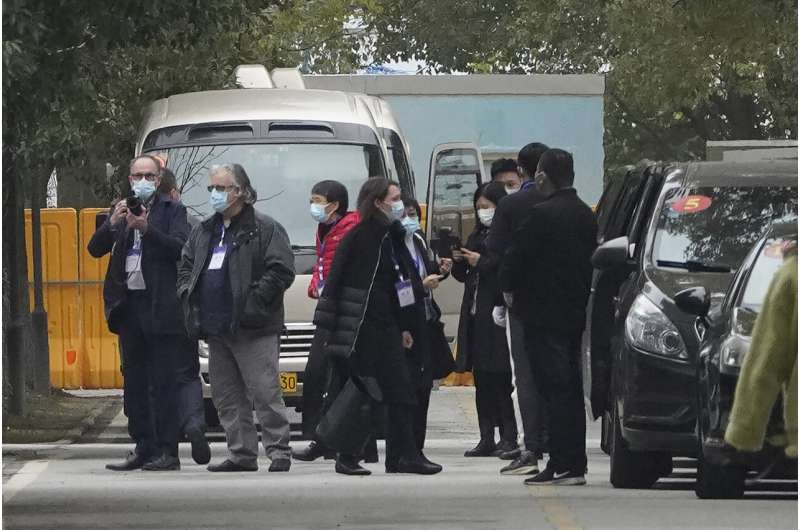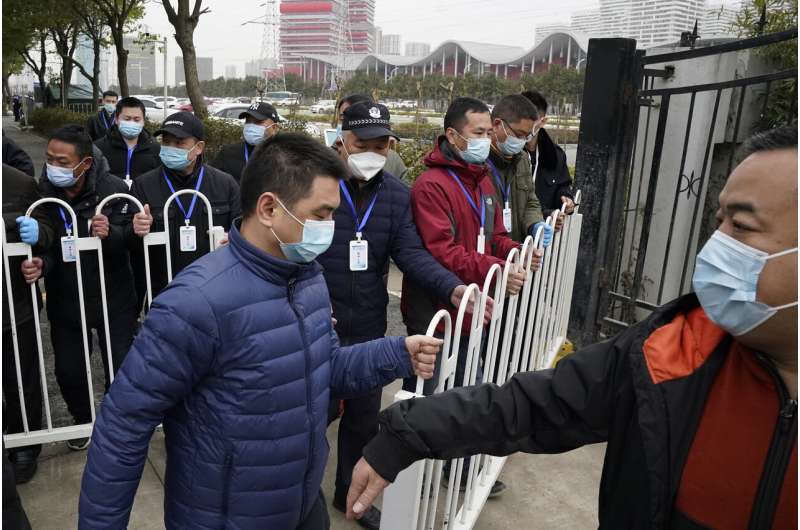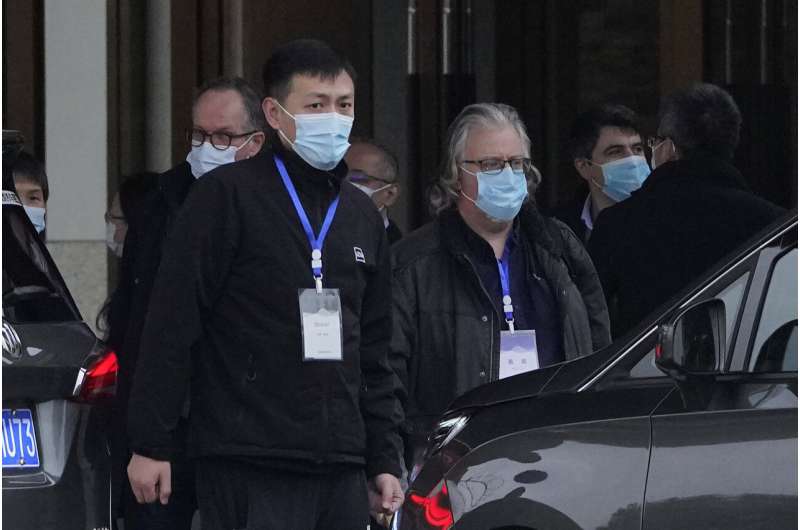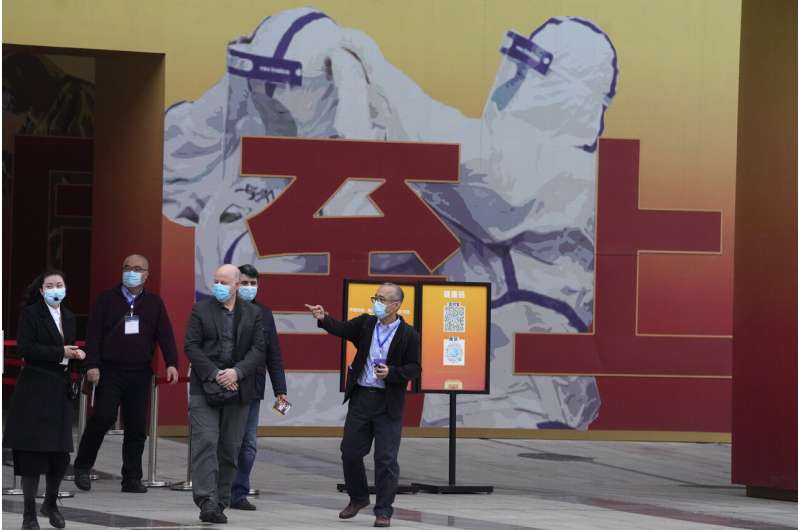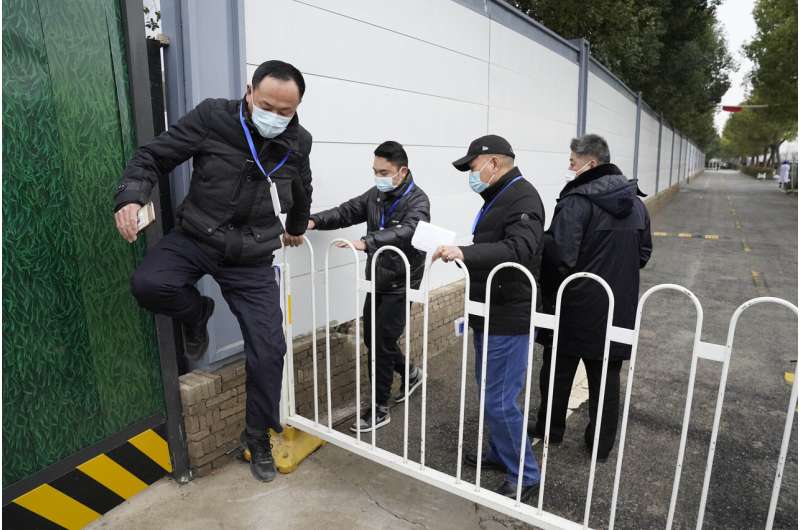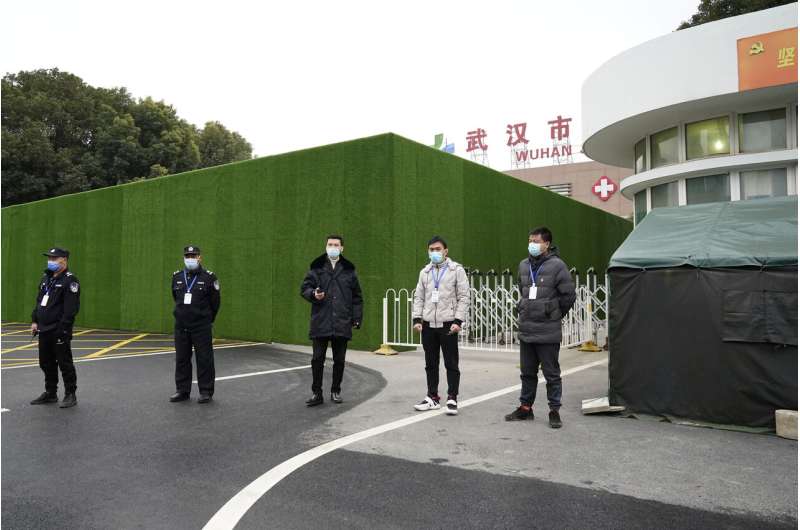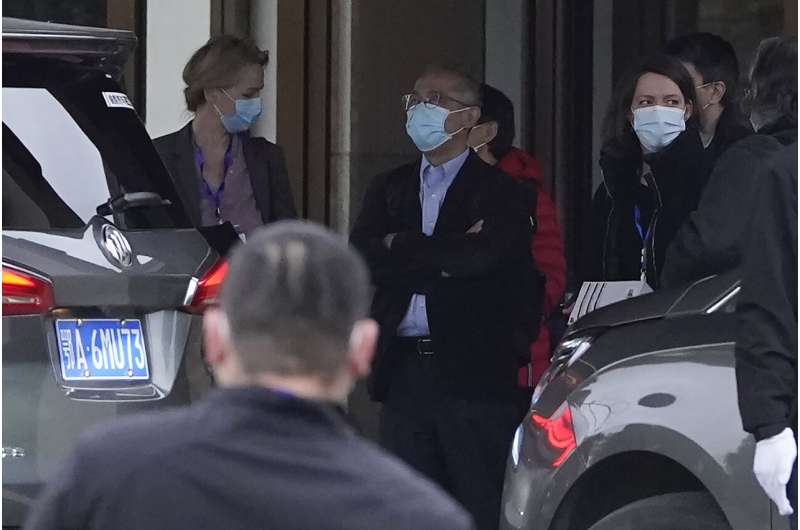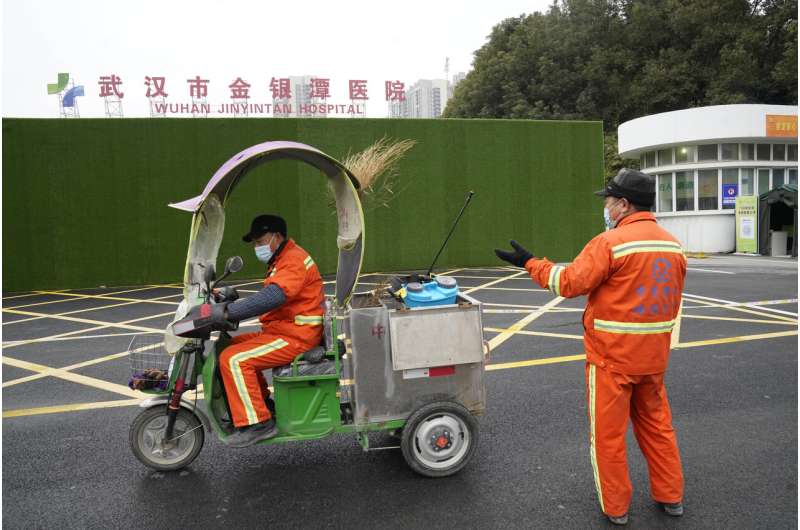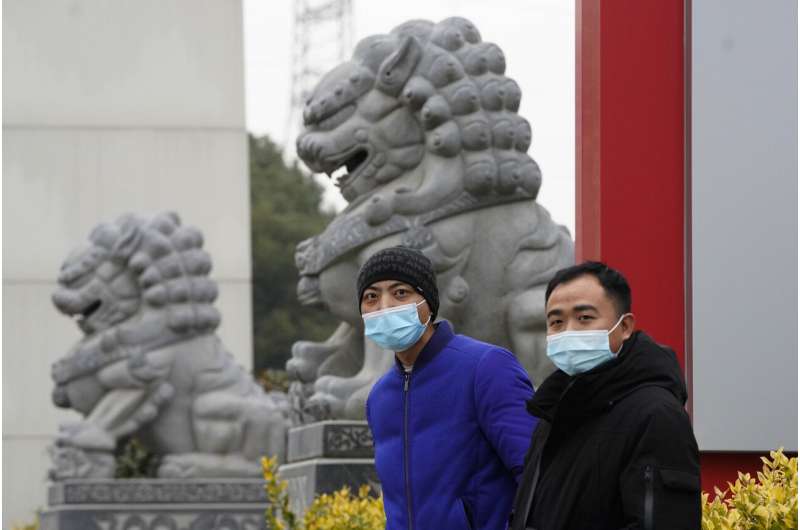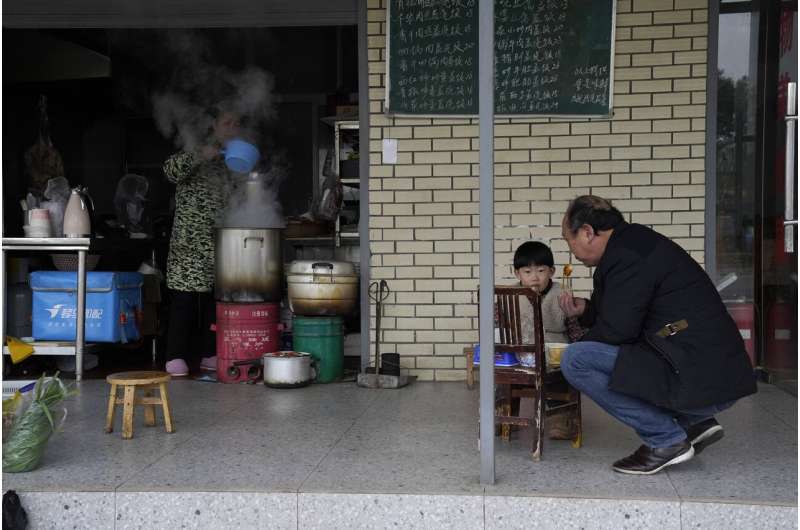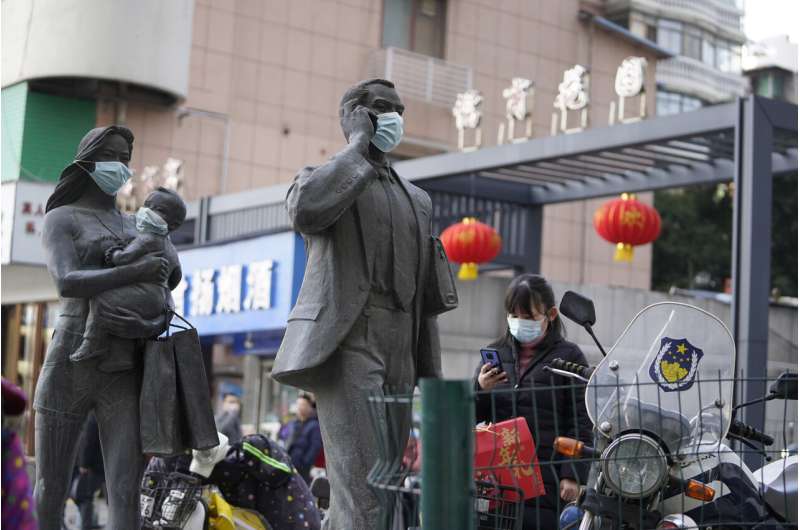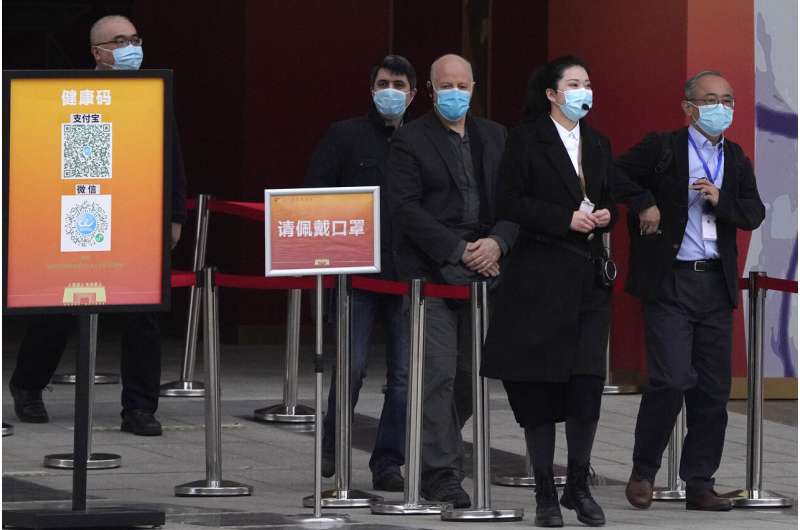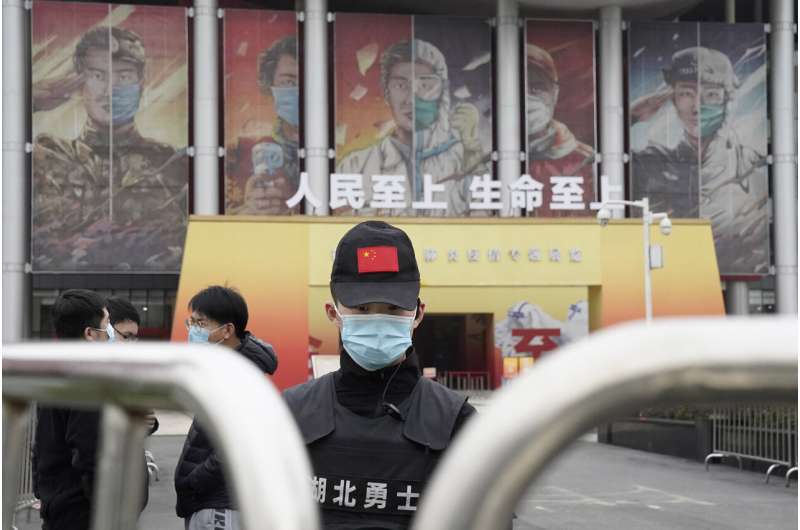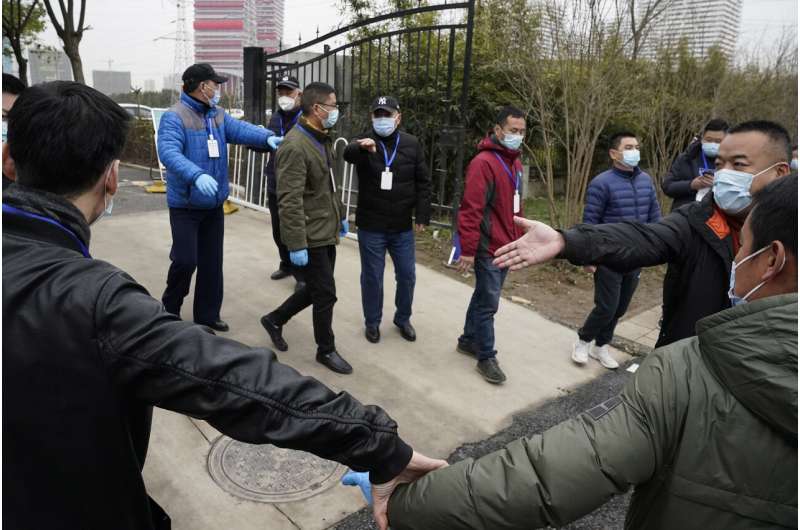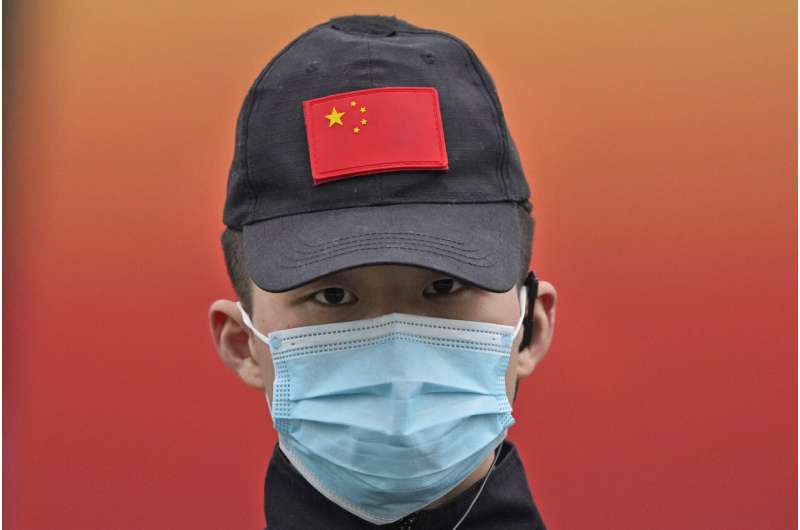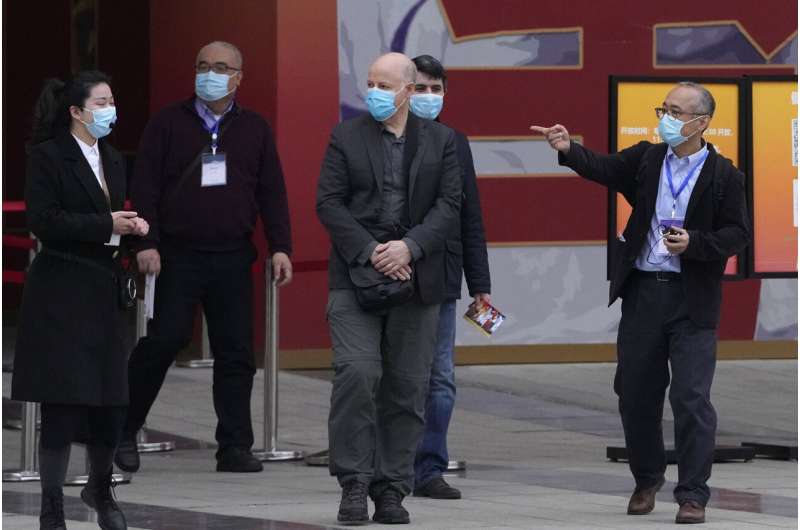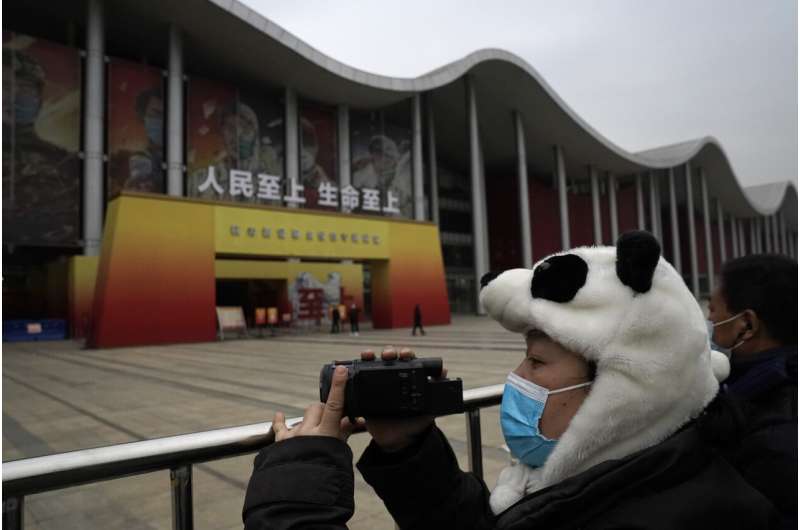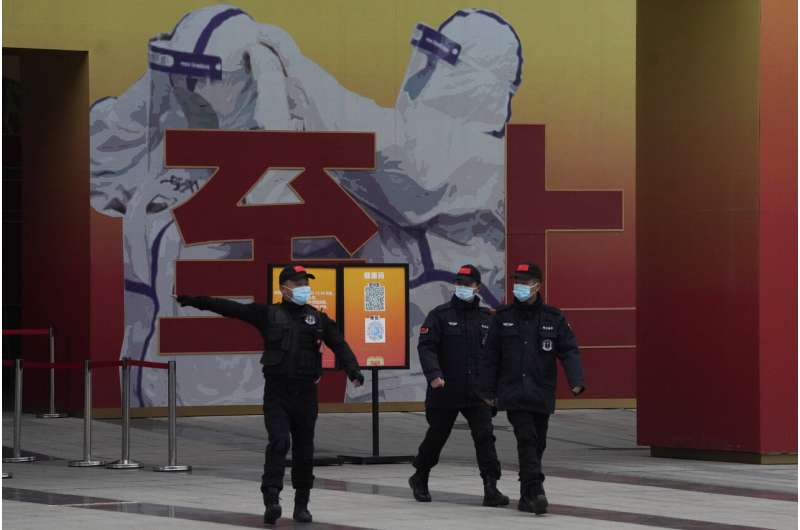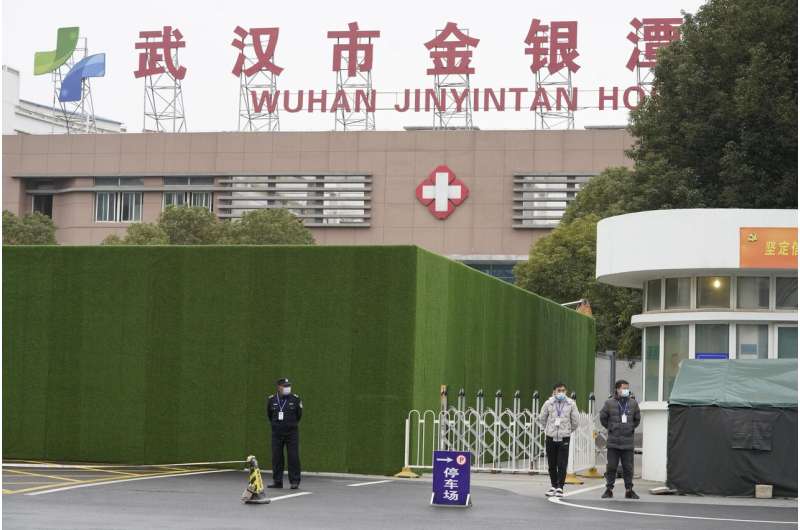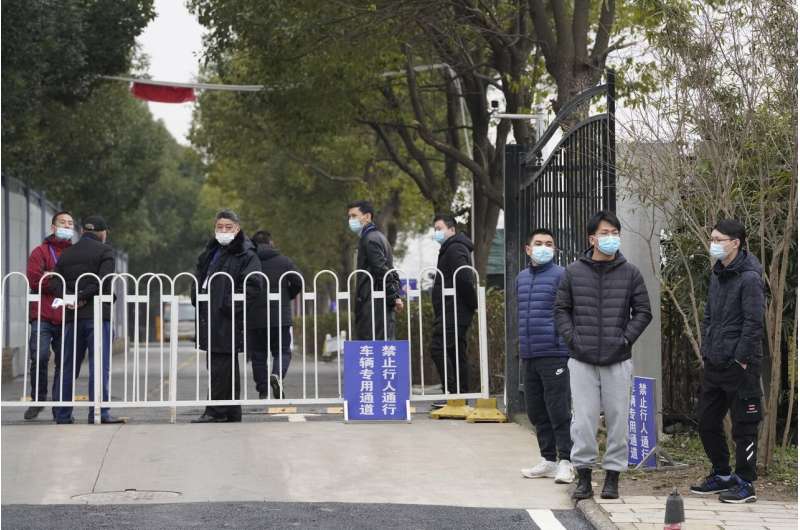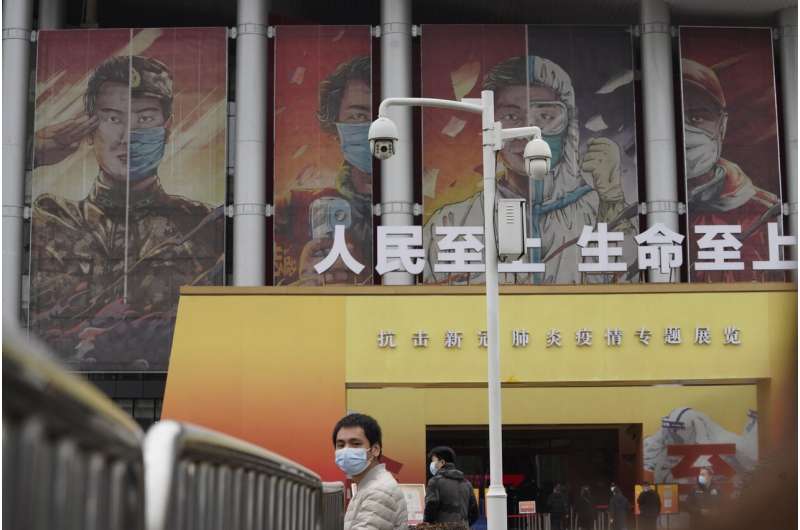Members of the World Health Organization team depart from the Wuhan Jinyintan Hospital after a field visit in Wuhan in central China's Hubei province on Saturday, Jan. 30, 2021. The World Health Organization team investigating the origins of the coronavirus pandemic visited another Wuhan hospital that had treated early COVID-19 patients on their second full day of work on Saturday. (AP Photo/Ng Han Guan)
Members of a World Health Organization team investigating the origins of the coronavirus pandemic visited another Wuhan hospital that had treated early COVID-19 patients on their second full day of work Saturday.
Wuhan Jinyintan Hospital was one of the first in the Chinese city to deal with patients in early 2020 suffering from a then-unknown virus and is a key part of the epidemiological history of the disease.
"Just back from visit at Jinyintan hospital, that specialised in infectious diseases and was designated for treatment of the first cases in Wuhan," Dutch virologist Marion Koopmans said in a post on Twitter. "Stories quite similar to what I have heard from our ICU doctors."
Zoologist Peter Daszak of the U.S. group EcoHealth Alliance, who is a member of the team, said in a tweet that the visit was an "important opportunity to talk directly" with medics who were fighting the virus at the critical time.
The team's first face-to-face meetings with Chinese scientists took place on Friday, before the experts who specialize in animal health, virology, food safety and epidemiology visited another early site of the outbreak, the Hubei Integrated Chinese and Western Medicine Hospital.
The Geneva-based WHO said late Thursday on Twitter that its team plans to visit hospitals, markets like the Huanan Seafood Market that was linked to many of the first cases, the Wuhan Institute of Virology, and laboratories at facilities including the Wuhan Center for Disease Control.
-
Security personnel move a barrier to clear the way for the World Health Organization team as they depart from the Wuhan Jinyintan Hospital after a field visit in Wuhan in central China's Hubei province on Saturday, Jan. 30, 2021. The World Health Organization team investigating the origins of the coronavirus pandemic visited another Wuhan hospital that had treated early COVID-19 patients on their second full day of work on Saturday. (AP Photo/Ng Han Guan)
-
Members of the World Health Organization team prepare to leave for a second day of field visit in Wuhan in central China's Hubei province on Saturday, Jan. 30, 2021. (AP Photo/Ng Han Guan)
-
Members of the World Health Organization team including Ken Maeda, center, Peter Daszak, third from left and Vladmir Dedkov, fourth from left, leave after attending an exhibition about the fight against the coronavirus in Wuhan in central China's Hubei province on Saturday, Jan. 30, 2021. The World Health Organization team investigating the origins of the coronavirus pandemic visited another Wuhan hospital that had treated early COVID-19 patients on their second full day of work on Saturday. (AP Photo/Ng Han Guan)
-
Security personnel jump across a barrier at an entrance to the Wuhan Jinyintan Hospital where a team from the World Health Organization visited in Wuhan in central China's Hubei province on Saturday, Jan. 30, 2021. (AP Photo/Ng Han Guan)
-
Security personnel guard an entrance to the Wuhan Jinyintan Hospital where a team from the World Health Organization visited in Wuhan in central China's Hubei province on Saturday, Jan. 30, 2021. (AP Photo/Ng Han Guan)
-
Members of the World Health Organization team including Ken Maeda, center, prepare to leave for a second day of field visit in Wuhan in central China's Hubei province on Saturday, Jan. 30, 2021. (AP Photo/Ng Han Guan)
-
Municipal workers leave after disinfecting an entrance of the Wuhan Jinyintan Hospital as the World Health Organization team makes a visit in Wuhan in central China's Hubei province on Saturday, Jan. 30, 2021. The World Health Organization team investigating the origins of the coronavirus pandemic visited another Wuhan hospital that had treated early COVID-19 patients on their second full day of work on Saturday. (AP Photo/Ng Han Guan)
-
Chinese men wearing masks stand near stone lions across from the Wuhan Jinyintan Hospital where a team from the World Health Organization visited in Wuhan in central China's Hubei province on Saturday, Jan. 30, 2021. (AP Photo/Ng Han Guan)
-
A man and child eat breakfast at a shop across from the Wuhan Jinyintan Hospital where a team from the World Health Organization visited in Wuhan in central China's Hubei province on Saturday, Jan. 30, 2021. (AP Photo/Ng Han Guan)
-
A woman wearing a mask walks past statues with masks placed on them in Wuhan in central China's Hubei province on Friday, Jan. 29, 2021. A World Health Organization team is visiting the central city of Wuhan where the coronavirus was first detected. (AP Photo/Ng Han Guan)
-
Members of the World Health Organization team including Ken Maeda, right, Peter Daszak, third from right and Vladmir Dedkov, second from left leave after attending an exhibition about the fight against the coronavirus in Wuhan in central China's Hubei province on Saturday, Jan. 30, 2021. The World Health Organization team investigating the origins of the coronavirus pandemic visited another Wuhan hospital that had treated early COVID-19 patients on their second full day of work on Saturday. (AP Photo/Ng Han Guan)
-
A security officer wearing a mask and a cap with the Chinese national flag guards the entrance after the World Health Organization team arrive at an exhibition about the fight against the coronavirus in Wuhan in central China's Hubei province on Saturday, Jan. 30, 2021. The World Health Organization team investigating the origins of the coronavirus pandemic visited another Wuhan hospital that had treated early COVID-19 patients on their second full day of work on Saturday. (AP Photo/Ng Han Guan)
-
Security personnel clear the way for the convoy of the World Health Organization team as they depart from the Wuhan Jinyintan Hospital after a field visit in Wuhan in central China's Hubei province on Saturday, Jan. 30, 2021. The World Health Organization team investigating the origins of the coronavirus pandemic visited another Wuhan hospital that had treated early COVID-19 patients on their second full day of work on Saturday. (AP Photo/Ng Han Guan)
-
A security officer wearing a mask and a cap with the Chinese national flag guards the entrance after the World Health Organization team arrive at an exhibition about the fight against the coronavirus in Wuhan in central China's Hubei province on Saturday, Jan. 30, 2021. The World Health Organization team investigating the origins of the coronavirus pandemic visited another Wuhan hospital that had treated early COVID-19 patients on their second full day of work on Saturday. (AP Photo/Ng Han Guan)
-
Members of the World Health Organization team including Ken Maeda right, Peter Daszak, third from left and Vladmir Dedkov, fourth from left, leave after attending an exhibition about the fight against the coronavirus in Wuhan in central China's Hubei province on Saturday, Jan. 30, 2021. The World Health Organization team investigating the origins of the coronavirus pandemic visited another Wuhan hospital that had treated early COVID-19 patients on their second full day of work on Saturday. (AP Photo/Ng Han Guan)
-
A journalist wearing a panda themed hat shoots with a camera outside an exhibition about the fight against the coronavirus when a World Health Organization team is visiting in Wuhan in central China's Hubei province on Saturday, Jan. 30, 2021. The World Health Organization team investigating the origins of the coronavirus pandemic visited another Wuhan hospital that had treated early COVID-19 patients on their second full day of work on Saturday. (AP Photo/Ng Han Guan)
-
Security personnel fan out as the World Health Organization team gets ready to leave after attending an exhibition about the fight against the coronavirus in Wuhan in central China's Hubei province on Saturday, Jan. 30, 2021. The World Health Organization team investigating the origins of the coronavirus pandemic visited another Wuhan hospital that had treated early COVID-19 patients on their second full day of work on Saturday. (AP Photo/Ng Han Guan)
-
Security personnel guard an entrance to the Wuhan Jinyintan Hospital where a team from the World Health Organization visited in Wuhan in central China's Hubei province on Saturday, Jan. 30, 2021. (AP Photo/Ng Han Guan)
-
Security personnel guard an entrance to the Wuhan Jinyintan Hospital where a team from the World Health Organization visited in Wuhan in central China's Hubei province on Saturday, Jan. 30, 2021. (AP Photo/Ng Han Guan)
-
A man wearing mask stands near barricade after the World Health Organization team arrived at an exhibition about the fight against the coronavirus in Wuhan in central China's Hubei province on Saturday, Jan. 30, 2021. The World Health Organization team investigating the origins of the coronavirus pandemic visited another Wuhan hospital that had treated early COVID-19 patients on their second full day of work on Saturday. The words on the wall reads "People First, Life First". (AP Photo/Ng Han Guan)
"All hypotheses are on the table as the team follows the science in their work to understand the origins of the COVID19 virus," WHO tweeted. It said the team had already requested "detailed underlying data" and planned to speak with early responders and some of the first patients.
The mission has become politically charged, as China seeks to avoid blame for alleged missteps in its early response to the outbreak.
A single visit by scientists is unlikely to confirm the virus's origins. Pinning down an outbreak's animal reservoir is typically an exhaustive endeavor that takes years of research including taking animal samples, genetic analysis and epidemiological studies.
One possibility is that a wildlife poacher might have passed the virus to traders who carried it to Wuhan. The Chinese government has promoted theories, with little evidence, that the outbreak might have started with imports of frozen seafood tainted with the virus, a notion roundly rejected by international scientists and agencies.
A possible focus for investigators is the Wuhan Institute of Virology. One of China's top virus research labs, it built an archive of genetic information about bat coronaviruses after the 2003 outbreak of SARS, or severe acute respiratory syndrome.
© 2021 The Associated Press. All rights reserved. This material may not be published, broadcast, rewritten or redistributed without permission.
